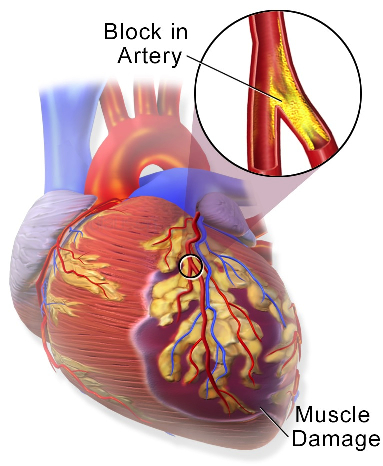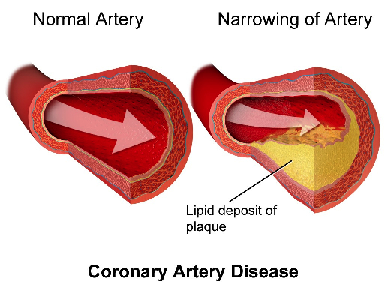Early Detection of Heart Disease
A heart attack happens every 42 seconds in the U.S.
The American Heart Association recommends that heart disease prevention begins early in life.
This means assessing your risk factors and working to keep them low. For those over age 40, or those
with multiple risk factors, it is important to calculate your risk of developing cardiovascular disease
in the next 10 years. Many first heart attacks or strokes are fatal or disabling, so prevention is critical.
The sooner you begin comprehensive risk reduction, the longer and stronger your heart will beat.

What is a heart attack?
A heart attack occurs when the blood flow that brings oxygen to the heart muscle is severely reduced or cut-off completely. The blood flow can slowly become narrow from a buildup of fat and cholesterol called plaque. The plaque in a heart artery can break free and a blood clot forms around the plaque. This blood clot can block the blood flow through the heart muscle.
Warning Signs
Some heart attacks are sudden and intense. But most heart attacks start slowly, with mild pain or discomfort.
Signs a heart attack:
Chest discomfort. Most heart attacks involve discomfort in the center of the chest that lasts more than a few minutes, or that goes away and comes back. It can feel like uncomfortable pressure, squeezing, fullness or pain.
Discomfort in other areas of the upper body. Symptoms can include pain or discomfort in one or both arms, the back, neck, jaw or stomach.
Shortness of breath with or without chest discomfort.
Other signs may include breaking out in a cold sweat, nausea or lightheadedness.
Women common heart attack symptoms are chest pain or discomfort in addition to shortness of breath, nausea/vomiting, and back or jaw pain.
Other factors that contribute to heart disease:
Stress: An individual’s response to stress may be a contributing factor. There is a connection between coronary heart disease risk and stress in a person’s life, their health behaviors and socioeconomic status.
Alcohol: Drinking too much alcohol can raise your blood pressure, increase your risk of heart attack and stroke, cancer and other diseases. It can contribute to high triglycerides, and produce irregular heartbeats. Excessive alcohol consumption contributes to obesity, alcoholism, suicide and accidents.
Diet: A healthy diet is one of the best weapons you have to fight cardiovascular disease. The food you eat can affect other controllable risk factors: cholesterol, blood pressure, diabetes and overweight. Choose low calorie nutrient-rich foods that have vitamins, minerals and fiber.
Prevention
Commit to a heart healthy lifestyle. Your lifestyle is your best defense against heart disease and stroke.
A heart-healthy lifestyle may require changes suggested in the list below:
– Stop smoking
– Choose good nutrition
– Reduce high blood cholesterol
– Lower high blood pressure
– Be physically active every day
– Set goals to get to your healthy weight
– Manage diabetes
– Reduce stress
– Limit alcohol

